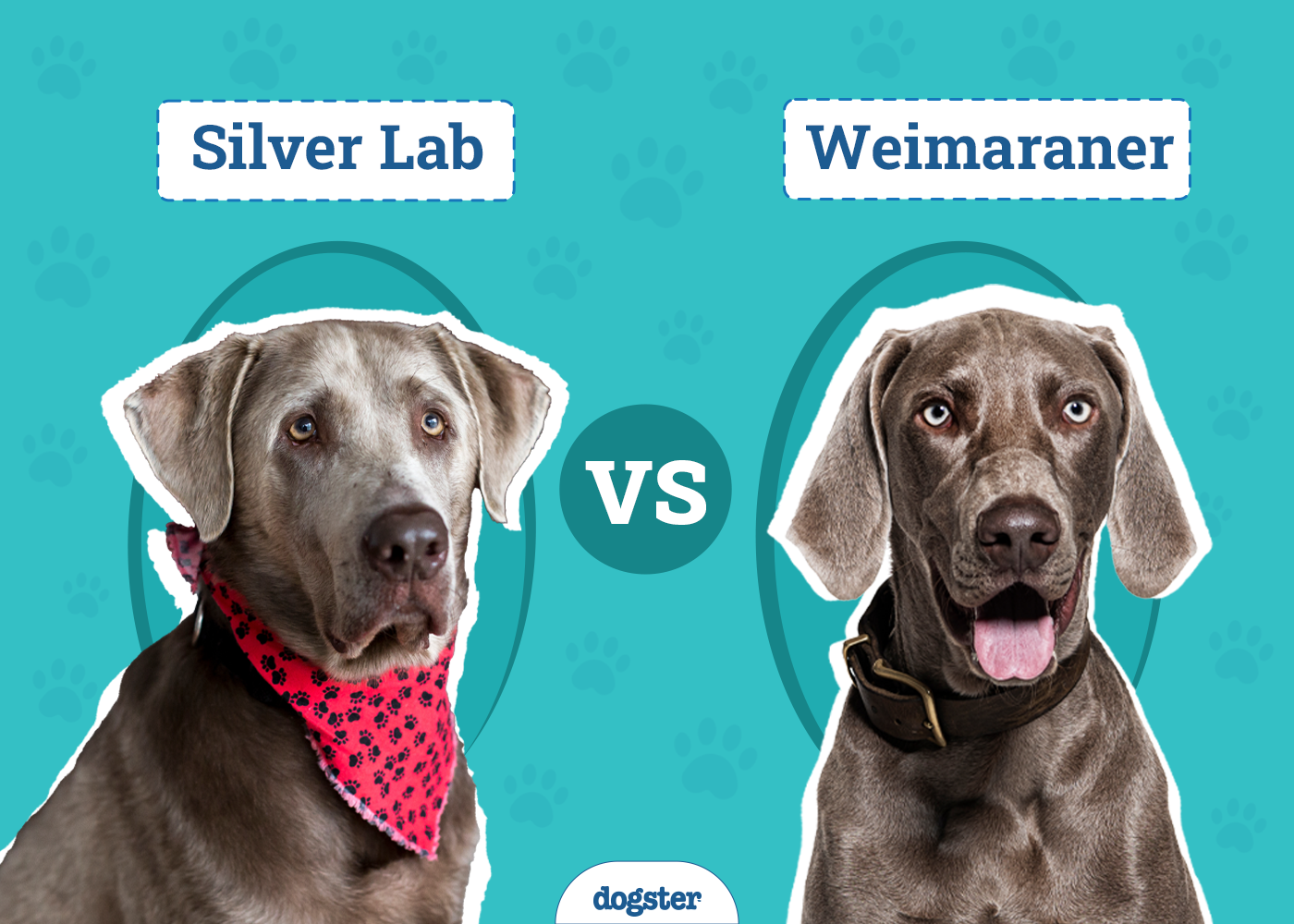In this article
View 3 More +Silver Labs and Weimaraners are two dogs that draw a lot of comparisons. They are very similar in color and have a similar temperament. The similarities are so prevalent that some people ask whether Weimaraners and Silver Labs are related. But what exactly is the difference between a Silver Labrador and a Weimaraner?
There is some controversy around the origin of Silver Labradors. Some believe that they came about originally due to the crossing of a Labrador Retriever with a Weimaraner. Many others believe that the recessive gene occurred naturally and by chance in the breed. These days it seems that the accepted answer is leaning towards naturally occurring. Either way, it seems Silver Labs are here to stay and we will compare them as if they are unrelated breeds.
Weimaraners are hunting dogs that still retain a lot of their working drive, while Labradors, whatever their color, have become extremely popular general-purpose dogs. The choice of which dog could be right for you will come down to a handful of key differences. Although both are often used as working dogs. Weimaraners are more likely to be found out in the field as Gundogs in the United States whereas Labradors are suited to many jobs such as gun dogs and assistance dogs. They are also America’s favorite family dog breed.
Here is everything you need to know about the difference between Silver Labs and Weimaraners.

Visual Differences

At a Glance
- Average height (adult): 21.5–24.5 inches
- Average weight (adult): 55–80 pounds
- Lifespan: 10–14 years
- Exercise: 1.5+ hours a day
- Grooming needs: Moderate
- Family-friendly: Yes
- Other pet-friendly: Yes
- Trainability: Extremely trainable, high energy, requires mental stimulation
- Average height (adult): 23–27 inches
- Average weight (adult): 55–90 pounds
- Lifespan: 10–13 years
- Exercise: 1–2 hours a day
- Grooming needs: Moderate
- Family-friendly: Yes
- Other pet-friendly: Often
- Trainability: Friendly, loyal, can be extremely obedient

Silver Lab Overview

Silver Labs are just a color variety of Labrador, such as Chocolate Labs, Yellow Labs, and Black Labs. The silver coat coloration is due to a recessive coat color dilution gene. They are essentially chocolate labradors that have two copies of this recessive gene, resulting in a silver-colored coat. Labradors are some of the most popular dogs in the United States for a reason. They are generally healthy, can be trainable, and often mature into amazing family dogs.
Silver Labs can be versatile dogs suited to a variety of working and home situations.
Personality
Another reason there is suspicion the Silver Lab is the result of cross-mating many years ago with a Weimaraner, is that anecdotally, Silver Labs do seem to have a temperament more akin to that of the Weimaraner than the other color Labs. Silver Labs often just want to have fun and burn off their considerable energy. They like to play, and they like to explore and go on adventures. Silver Labs are generally fun, energetic, and outgoing. They are great with families and it is said they rarely ever meet a stranger. Silver Labs tend to be good with children and other dogs.
Anecdotally, there are reports that they can be more anxious and stubborn than other color Labs but this may be down to early life experiences rather than color.

Training
Labradors can be very trainable and generally love food making reward-based training relatively easy. However, when they are young and energetic, Silver Labs can be stubborn and difficult to manage. Silver Labs will need plenty of exercise, consistent training, and careful socialization in order to thrive. It is just as important to remember to exercise their minds daily as well.
Silver Labs can be obedient and loyal dogs, but they can be willful before the training takes hold. It is usually best to engage the help of a qualified trainer to help you through the early years.
Health
Labradors are generally healthy dogs but there are conditions that they are more prone to. Silver Labs, as Labradors, have the same health profile as other Labs. The most common health issues are obesity, joint problems, and ear infections1. The Silver Labs do seem to be more prone to poor hair coats and skin-related disorders. This could be related to the fact that chocolate labs have also been shown to be more commonly affected by ear and skin disorders.
As the genetics required to breed Silver Labs require a double recessive gene, they must inherit one from each parent. This can result in the breeding of a relatively small pool of dogs to get the unusual coat color. If you have any concerns around this then you can check the breeding coefficient for the dogs.

Energy & Exercise
Silver Labs have very high energy levels when they are young, but they gradually slow down as they age. From puppyhood until around age five, Silver Labs will need a lot of physical activity and mental stimulation. After 5 years old, Silver Labs start to slow down and will gradually become lazier and cuddlier.
When Silver Labs are young, they will need long walks and frequent play sessions. As they age, they will need a more standard level of physical activity. Don’t forget to keep their minds engaged too or they will probably end up finding entertainment for themselves.
Suitable For:
Silver Labs can be suitable for people looking for a medium to large active breed. They are great for families, and active people. Potential owners should be aware that young Silver Labs are going to require a lot of time and attention. However, older Silver Labs can be very sweet and cuddly.
If you do not have the time and energy to deal with a Silver Lab puppy, you might want to consider finding a Silver Lab at the shelter that is older. Silver Labs may appear in local shelters and at rescues more commonly than Weimaraners.

Weimaraner Overview

Weimaraners are athletic hunting dogs that have a lot of energy and a lot of personality. People love Weimaraners for their unique appearance, gorgeous color, and hunting pedigree. These dogs are perfect for people who like to spend a lot of time outside or who like to work out with their dogs. Weimaraners can also make loyal lifelong companions and good protectors.
Weimaraners can be very willful, especially when young, and you need to know what goes into their energy and personality before choosing a Weimaraner over another dog. These are large muscular dogs that need to have the space to work off their energy and learn polite manners to keep them out of trouble.
Personality
Weimaraners are known for being very loyal, obedient, and sweet. They do great with their owners and their families. However, Weimaraners can also be anxious and stressed. Anxious Weimaraners can often be on alert, they can bark a lot, and they might even nip.
These are usually not problems for a Weimaraner’s immediate owner or family but could affect strangers, friends, and extended family that are not around all the time.

Training
As working dogs, Weimaraners were bred to be trained. Weimaraners do very well on a schedule and have the ability to learn a large variety of commands. Weimaraners were meant to work alongside humans in order to complete a task or goal.
However, you do need to socialize your Weimaraner, and you need to manage their energy levels in order to increase your likelihood of getting the training to stick. Not everyone will be able to handle an overly energetic or stubborn Weimaraner.
Health
Weimaraners are very active dogs, and most of their health issues are exercise-related. They are not prone to many congenital or genetic diseases or disorders. Weimaraners are prone to getting scrapes, cuts, and soft tissue injuries. They also are strong chewers, and they can chew objects and swallow things that they shouldn’t.
One of the most common life-threatening conditions is bloat (gastric torsion) which affects dogs like Weimaraners and Great Danes. Weimaraners are also prone to hip dysplasia and joint issues due to repeated physical motion.

Energy & Exercise
Weimaraners are extremely energetic, especially when they are young. Weimaraners were originally bred as working hunting dogs. That means that they are suited to spending a lot of time outside. They like to be moving, working, and exploring. Weimaraners need a lot of consistent exercise to keep their energy levels at a manageable level.
Weimaraners need both mental and physical stimulation. If you cannot take your Weimaraner for long walks, hikes, or out for long play sessions, you might want to consider making a different choice.
Suitable For:
Weimaraners can be suitable for a number of different people. Weimaraners are great for active people or families. They can also work for people who like to go hunting or hiking. Someone who is looking for a trainable dog with a high ceiling for learning will also get a lot out of Weimaraners.
These dogs are not suitable for someone looking for a couch potato dog or someone who needs to leave their dog alone for long periods of time with little stimulation.

Frequently Asked Questions
Are Silver Labs and Weimaraners Related?
This does seem to depend on who you ask. Silver Labs and Weimaraners are not officially related. Breeders of Silver Labs and enthusiasts of the color, strongly believe that the coat color variation appeared as a genetic quirk in the North American purebred Labrador breed in the 1950’s. However, there is also reportedly a note of a Silver Lab in England as far back as 1904. Others are equally as vocal that the Silver color came from cross-breeding with Weimaraners back in the 50’s, which has not been owned up to.
The AKC did investigate and were unable to discover evidence of the crossbreeding but still have a stance that silver is an undesirable coat color in purebred Labs. We will leave it up to you to decide.
There will undoubtedly be unscrupulous breeders who breed Weimaraner into Labradors in order to get the rare silver color and charge a premium for it, so buyer beware.
Obviously, if you breed a Weimaraner with a Labrador, the resulting puppies will no longer be purebred.
Are Silver Labs Rare?
Silver Labradors are uncommon. The silver color comes from a unique genetic pattern that is far less common than Chocolate, Yellow, or Black Labradors as two copies of the recessive d gene must be inherited.
In fact, Silver Labs are not accepted by the American Kennel Club (AKC) as silver is not an official breed color. Silver Labs can still be registered with the AKC if they meet the other criteria but will not be registered as Silver, and are not permitted to be shown in official competition.
Despite that, Silver Labs have been steadily growing in popularity, and more people are seeking them out because of their aesthetics. Silver Labs are the least common color of Labrador.

Do Silver Labs All Have Blue Eyes?
No. Many Silver Labs are born with blue eyes and will have blue eyes as puppies. However, as they age, their eyes will often darken and change into a yellow, brown, or hazel color.
Do Weimaraners All Have Blue Eyes?
All Weimaraners are born with blue eyes, but their eyes don’t always stay blue. A puppy’s eyes will start a vibrant blue or gray color before slowly changing into a color that will be more permanent. Weimaraner eyes can be light amber, gray, or blue-gray.

Do Silver Labs or Weimaraners Cost More?
Silver Labs and Weimaraners both cost a similar amount. Weimaraners have a higher ceiling than Silver Labs due to the fact that a good working Weimaraner with a proven hunting pedigree can cost a considerable amount. The average cost of a Silver Lab is around $1,000, with the upper limit being close to $1,800. The average cost of a Weimaraner is also around $2,000, but the upper limit can be $3,000 for a quality pedigree.
Silver Labs can cost considerably more than traditional Chocolate, Yellow, or Black Labradors due to their scarcity and current popularity.

Which Breed Is Right for You?

Weimaraners and Silver Labs are similar on many levels. They have a very similar color, coat, and build. They can both be very trainable, very friendly, and highly athletic. Weimaraners require more stimulation and training than Silver Labs. They can also be more anxious, more stressed, and more prone to aggression than a Silver Lab.
Silver Labs are more typical dogs that are happy-go-lucky. If you want a large dopey dog, you will want to go with a Silver Lab. If you want a more athletic dog that thrives in a working role and likes structure, you will enjoy the Weimaraner.
- See also: How Much Does a Shih Poo Cost?
Featured Image Credit: Top – Sandra M. Austin, Shutterstock | Bottom – Karolina Grabowska, Pexels





















2 Responses
Your article on the difference between the Silver Lab and the Weimaraner was very informative. I just bought a silver lab to add to our family and I definitely picked the right pup. But I was always under the impression that the silver labs had the Weimaraner gene in them and I just learned they do not. Thank you for straightening up that one information for me and others.
Soooooooooooooo True!